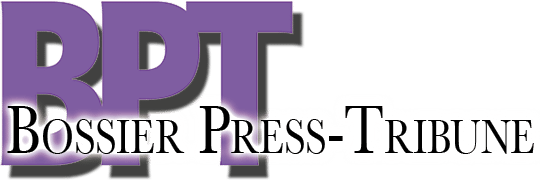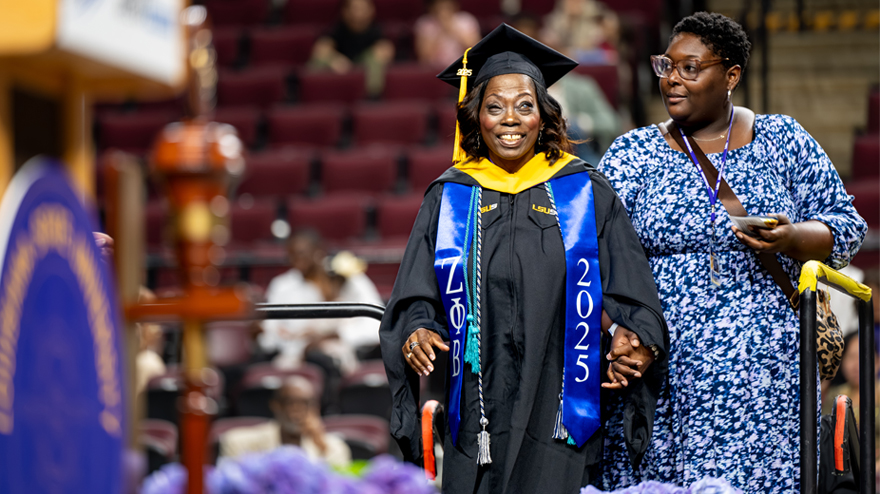LaShawn Benita Harley-Hill slowly climbed each step of the graduation stage. One foot in front of the other, holding the hand of Patience Davis, the coordinator for access and advocacy.
Harley-Hill is blind – “can’t see a lick” – but she earned her master’s degree in counseling from LSUS at the spring commencement ceremony.
Her journey to cross the graduation stage, which received a standing ovation from the Brookshire Grocery Arena crowd, mirrors her journey since losing her eyesight to diabetes in 2017.
“It felt really amazing,” Harley-Hill said. “I started to tear up many times that day, but I didn’t want to mess my up my makeup. I wanted to stay pretty for my photos
“It was an amazing feeling to know that all of my classmates were looking for me at graduation, and I got big hugs from classmates and LSUS staff. I got home that day, took my makeup off and just cried.”
Tears were a common companion as Harley-Hill said she cried every day for a month after the gradual decline of her eyesight led to total blindness on Jan. 17, 2017.
“I thought, ‘God I can’t do this,” Harley-Hill said. “I can’t drive, I’ve got to depend on people – I felt like a burden.
“My husband Columbus told me it’s OK, it’s not the end of the world, and that people go through what they go through. Just ask God for help, and we’re going to get through this.”
The 2017 date sticks out because it’s one day after Founder’s Day for Zeta Phi Beta Sorority, Inc. She was an avid Greek during her undergraduate college days at Morgan State University where she earned a bachelor’s degree in psychology as a person who could see.
At age 54, Harley-Hill excelled in her master’s degree through patience and determination, but she’s quick to give credit to her vast support system.
Husband Columbus picked her up from class after hours and drove her back to their Bossier City home. She used SporTran’s Liftline (now called OnDemand) to get to LSUS and her various practicum and internships, a feature of the City of Shreveport’s paratransit service.
She worked for what’s now Ochsner LSU Health hospital at the time of her gradual visual decline, and optometrist Dr. Scott Kavanaugh directed her to the Louisiana Association of the Blind (LAB) to help in regaining daily life functions.
“My husband had to reorganize my clothes, my closet and our home so I’d know where everything is,” said Harley-Hill, who has been married for nine years. “An occupational therapist came in and made sure I knew where everything is, putting bump stops on different things.
“I get around really well now.”
LAB assisted Harley-Hill with a smart cane, a computer with software that can read material to her, and technical support.
“I would meet with Kirk Metzger every week, and he’d go through my computer and make sure that the documents and downloadable books I had were in Microsoft Word so that the software could read it to me,” Harley-Hill said. “I listened to my material, sometimes taking notes on it.
“LSUS professors were very understanding in giving me time to complete my assignments. Email was the key for me, and they worked with me and converted everything I needed into Word. When I wrote papers, (LSUS) librarians like Abigail McCoy and Martha Dauzat would help me pull articles based on my topic.”
Harley-Hill added that her voice recorder was a lifesaver as she recorded lectures for playback.
On the physical campus, a mobility instructor helped Harley-Hill locate her classes each semester. Smart canes contain technology that assists the user in identifying obstacles and navigate through GPS.
“There were times when I wanted to throw in the towel because there’s a lot going on, but I didn’t give up,” Harley-Hill said. “I also had a lot of strong classmates like Jakob Rogas. They texted me to make sure I was good, sometimes offering advice on how to accomplish something.
“Strong classmates and church members got me through it.”
Harley-Hill credits LAB for encouraging her to return to college two-and-a-half years ago with Louisiana Rehabilitation Services making it financially possible through a grant.
“Toni Collins was an employment specialist, and I had talked about wanting to counsel and talk to people,” Harley-Hill recalls. “She asked about me going back to school.
“I said, ‘At my age?’ Well OK, let’s do it.”
Harley-Hill finished her degree with a 3.9 GPA, which includes a rehabilitation track that requires an extra four classes.
“A disability doesn’t stop you from doing things, it just might slow you up a little bit,” said Harley-Hill, who added that diabetes runs in her family and isn’t diet-related in her case. “We can do just as much as anybody else, it might just take a little longer.”
After practicum and internships with Uprising Addiction Center and Louisiana Rehabilitation Services, Harley-Hill will officially start her new career as a counselor with Pelican Bayou Counseling in Shreveport.
“I’ve got great experience in working with people with everything from deafness and vision impairment to people dealing with substance abuse,” Harley-Hill said. “I can offer hope as a counselor and use my experiences to help others.
“I hope I can be an inspiration and an example of not giving up. Just because things happen in your life, don’t count yourself out. Anything is possible through faith, and you can do anything if you set your mind to it.”



